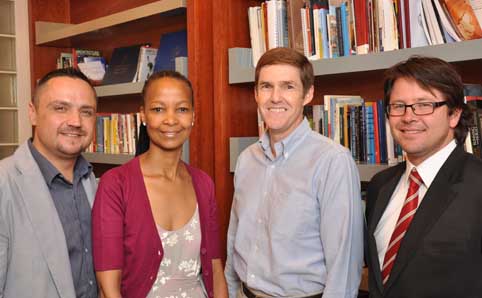Latest News Archive
Please select Category, Year, and then Month to display items
12 October 2020
|
Story Arina Engelbrecht
|
Photo Supplied
 Arina Engelbrecht from Organisational Development and Employee Well-being believes physical activity has a number of benefits for one’s health, including stress relief.
Arina Engelbrecht from Organisational Development and Employee Well-being believes physical activity has a number of benefits for one’s health, including stress relief.
Being physically active plays a big role in preventing the development of mental-health problems and in improving the quality of life of people experiencing mental-health problems.
Treatment for depression
Physical activity can be an alternative treatment for depression. It can be used as a stand-alone treatment or in combination with medication and/or psychological therapy. It promotes all kinds of changes in the brain, including neural growth, reduced inflammation, and new activity patterns are formed that promote feelings of calm and well-being. It releases endorphins – powerful chemicals in the brain that energise your spirit and make you feel good.
Physical activity can be very effective in relieving stress. Research in adults has found that physically active individuals tend to have lower stress levels compared to individuals who are less active. It also leads to improved sleep. When a person sleeps better and feels more rested, overall quality of life improves. They cope better with daily life stressors.
Reduce Alzheimer's risk
Regular physical activity can reduce your risk of developing Alzheimer's disease by up to 50%. It can also slow down further deterioration in those who have already started to develop cognitive problems. It stimulates the brain’s ability to maintain old connections as well as to make new ones.
A study asked people to rate their mood immediately after periods of physical activity (e.g. going for a walk/run, cycling, doing housework) and periods of inactivity (e.g. reading a book or watching television). Researchers found that participants felt more content, more awake, and calmer after being physically active compared to after periods of inactivity.
In conclusion, people who are physically active feel a sense of well-being, feel more energetic throughout the day, sleep better at night, have sharper memories, and feel more relaxed and positive about themselves and their lives.
“Being physically active not only changes your body, it changes your mind,
attitude, and your mood.” – Arina Engelbrecht
US Consul-General learns about transformation at the UFS
2011-11-11
 |
|
A delegation from the US consulate came to learn more about our transformation initiatives and the Leadership for Change programme. From the left are: Prof. Aldo Stroebel, Director of International Academic Projects in the Office of the Vice-Chancellor; Mrs Dineo Gaofhiwe-Ingram, Assistant-Director: International Affairs; Mr Earl Miller, US Consul-General; and Mr Rudi Buys, Dean of Student Affairs.
|
When others visit our university to learn more about our transformation initiatives, we certainly are on the right track.
Mr Earl Miller, Consul-General at the United States Consulate in Johannesburg, paid our university a visit as part of his orientation trip to the Free State.
Mr Miller, who was accompanied by two senior colleagues from his office, was interested to learn more about our university’s initiatives relating to transformation, the Leadership for Change programme and the work done at the International Institute for Studies in Race, Reconciliation and Social Justice.
He met with some of the students who had recently returned from the USA and Europe to reflect on their experiences on the programme and expressed his appreciation for the initiative, since it also afforded American students an opportunity to learn from their South African peers.